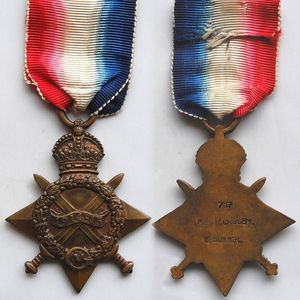Difference between revisions of "1914-15 Star"
From Our Contribution
(→Armadale) |
(→Armadale) |
||
| Line 74: | Line 74: | ||
* [[James Kershaw]] | * [[James Kershaw]] | ||
| − | + | * [[Edgar Leslie Livermore]] | |
* [[Alexander Russell Main]] | * [[Alexander Russell Main]] | ||
| Line 100: | Line 100: | ||
* [[Thomas Edward Raine]] | * [[Thomas Edward Raine]] | ||
| − | + | * [[William Rawlinson]] | |
| − | + | * [[Charles Joseph Gerald Raynor]] | |
| − | + | * [[William Harold Raynor]] | |
| − | |||
* [[Edward James (Ted) Rouse]] | * [[Edward James (Ted) Rouse]] | ||
* [[Francis Henry Ryniker]] | * [[Francis Henry Ryniker]] | ||
Revision as of 03:02, 8 July 2022
Contents
Eligibility
The 1914-15 Star was awarded to servicemen and servicewomen who served between 5 August 1914 and 31 December 1915 in any "theatre of war". This included service at Gallipoli between 25 April 1915 and 31 December 1915, service in Egypt between 5 November 1914 and 31 December 1915, and service during the capture of German Samoa on 29 August 1914.
Those eligible for the medal must have "served on the establishment of a unit in a theatre of war" during the relevant dates of operations in that area.[1]
Description
The 1914-15 Star is a crowned four-pointed star with crossed swords and a wreath of oak leaves, with the royal cypher at the foot and a central scroll inscribed 1914-15. The 1914-15 Star is identical to the 1914 Star, except for the omission of AUG and NOV, and the scroll across the centre being inscribed 1914-15.
The reverse of the 1914-15 Star is plain, except for the inscribed name and service details of the recipient. The medal is bronze and is attached to the ribbon by a ring.
Throughout the British Empire 2,078,183 1914-15 Stars were awarded. Few if any Australians were awarded the 1914 star.
Armadale
- † William Barge
- Ronald Adolphous Julian Batt
- † Edward James Bell*|John Blake
- † Henry Bolton
- Arthur Percy Thomas Boyle
- Richard William Thomas Boyle
- James (Roy) Braidwood MM MID
- Henry Thomas (Harry) Brear
- Edward Briggs
- Harry Redcliffe Broadhurst
- William Buck
- Leonard Henry (Lennie) Buckingham MM
- † Thomas Buckingham
- Albert George Bullock
- William Edward Butcher MM RMG MID
- Arthur Charles Cam
- Clarence Roy Champion
- Stanley Joseph Callow Champion
- Victor Norman Chandler MM
- Henry Frampton (Harry) Clarke
- † Frederick Lawrence Close
- Henry Thomas Cockram
- George Sidney Cook
- Claude Francis Cooper
- Alexander Russell Main
- Harold V Marshall
- Alfred Arthur Martin
- Alice Maud Martin
- Francis Leonard Martin
- George Henry Martin MM MID
- William Clarence Martin DCM & Bar
- William John Martin (1278)
- Leonard Roy Matthews
- Melbourne Hubert Randolph Matthews
- Sydney Clarence Owen Matthews
- Samuel Vivian Mortimer
- Frederick Edwin Murphy
- Charles Edward Parkin
- Frederick Thorneycroft Plant
- Keith George Harman Podger
- Charles William Price
- Henry George Price
- Thomas Edward Raine
- William Rawlinson
- Charles Joseph Gerald Raynor
- William Harold Raynor
- Edward James (Ted) Rouse
- Francis Henry Ryniker
- Robert Melville Salter
- Hector Lionel Saw
- Euphemia Weir Huntley Scott
- Amos Roy (Roy) Smith
- Edward Harris (Ted) Smith
- Hugh Henry Smith
- John Harold Rupert Smith
- William Stephens
- Harold Stinton
- † Arthur William Symonds
- William Archer Waller
- Frank Erle Waters
- Lawrence Hamill White MM
- James Murray Whiteley
- Aubrey Jesse Whittington MM
- Douglas Campbell Wills Winning
- James Winning
- Vernon Claude Witney
Post WW1 arrivals in the district
- Ivor Trehane Birtwistle
- Reginald Thomas (Reg) Cockshott
- Gordon Devereux MM
- Spencer Gwynne DCM MID
- William (Bill) Hart
- Robert George McLean
- Reginald Grove Sexty MID
Canning
| Samuel Thomas Lowth | Jesse Thomas Manser | [[]] | [[]] | [[]] | [[]] |
Gosnells
Serpentine-Jarrahdale
Post WW1 arrivals in Serpentine-Jarrahdale
Notes
Initially this medal was not intended for those who fought at Gallipoli. Instead it had been proposed that a 'Gallipoli Star', or 'ANZAC Star' would be given to Australian and New Zealand troops. However, there was unease in Britain that men from other Commonwealth nations would not be eligible and so, despite it having been approved by King George V, it was substituted with the 1914-15 Star.[2]
In 1967 Gallipoli specific service was rewarded in Australia and New Zealand with the issue of a Gallipoli Medal (not intended to be worn) to those who were eligible, or their next of kin.
References
- ↑ http://medals.nzdf.mil.nz/category/h/h5.html
- ↑ The Oxford Companion to New Zealand Military History (Oxford University Press, Auckland, 2000), p.226
